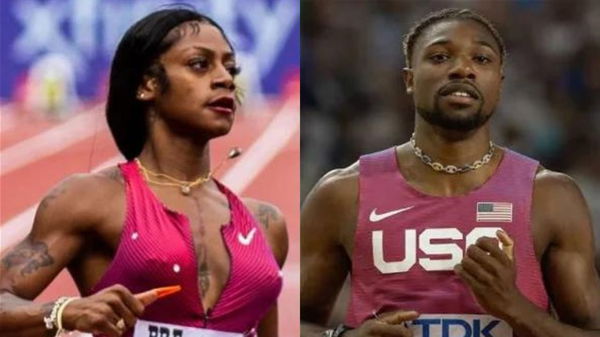
via Imago
Image credits : Imago

via Imago
Image credits : Imago
The 2021 Tokyo Olympics turned out brutally contrasting for two of the USA’s best sprinters. While one proudly adorned the tag of an Olympic medalist, the other one could not even step into the arena despite qualifying for that. Yet, Noah Lyles and Sha’Carri Richardson struck a chord with each other on a similar ground: their voices on mental health issues were heard.
- “Somebody asked me why I told people on Twitter that I was on antidepressants. It was strictly for the idea that I had taken something and it made me feel better… I want you to know that it’s OK not to feel good and you can go out and talk to somebody. … This is a serious issue. You don’t want to wake up one day and think, ‘I don’t want to be here anymore.” –Noah Lyles after winning bronze in 200m at the 2020 Olympics
- “It sent me into a state of emotional panic…I didn’t know how to control my emotions or deal with my emotions during that time.” –Sha’Carri Richardson after her disqualification from the Tokyo Olympics for testing positive for Marijuana (which she used to smoke to relieve the pain of the demise of her mother).
But if the demon is there, the weapon to subdue it has to be there. 2024 European Championships mixed relay champion Sharlene Mawdsley uncovered one such that helps to keep her mentally sound amid the fiercely competitive sporting world.
ADVERTISEMENT
Article continues below this ad
In an exclusive interview with IMAGE in April, Mawdsley was asked, “How do you mind your mental health?” The 25-year-old Irish sprinter had lost the mental health battle just before the Tokyo Olympics. Unable to handle the pressure of qualifying for the grandest stage, the Tipperary native eventually squandered the opportunity. It was then she started visiting a sports psychologist. So, in the interview, Mawdsley admitted straight away, “By working with my sport psychologist and talking to my support team if I’m struggling.” And that indeed helped her big time. How?

“I think I’m definitely getting mentally stronger and that’s purely because of the work that I’ve put in with my sports psychologist and speaking about it has helped loads…All it took was for me to have one conversation to realize how much I was really struggling. Once I was able to have that one conversation, it opened up so many doors to improve mentally,” Mawdsley had explained in a 2022 conversation with RSVP Live. That channelization of the pain is of paramount importance. Noah Lyles and Sha’Carri Richardson have also pointed that out in their recent conversations.
In February, Noah Lyles openly admitted to talking to his therapist to overcome pressure. Just after winning the 60m dash at the New Balance Indoor Grand Prix, Noah was asked if he had put any pressure on himself while going into the Olympics. “I did in Tokyo, but not this year…I was talking to my therapist last night Diana, and I was like…I want this position to be great and I want to do this and that but I think I’d rather just keep it simple,” came Noah’s reply. Sha’Carri, on the other hand, banks on her family to keep her sane.
ADVERTISEMENT
Article continues below this ad
“I’ve created my own type of environment where I’m locked in on a day to day. With my family and my friends, I’m in this bubble and I don’t have to worry about the outside stuff getting in. It’s easy to maintain that motivation and focus,” Richardson said to Yahoo Sports just before securing her first 100m win of the season at the Prefontaine Classic on May 25. Despite efforts to put up a brave face against the problem, saddening outcomes could not be prevented on some occasions.
Open up: that is the only way out
Women in sports are still lagging, and adding the mental health angle can prove to be a deadly combination. A stark reminder of the same was the case of 2016 Olympic gold medalist Tori Bowie. Bowie, who won the team gold in the 4x100m relays, died on April 23, last year, while being eight months pregnant. She was said to have died of childbirth-related complications. But her autopsy report mentioned a small but startling revelation. She was suffering from bipolar disorder, a mental health condition that causes extreme mood swings.
ADVERTISEMENT
Article continues below this ad
Referring to that, Bowie’s coach AI Joyner stated, “It’s not that she slipped through the cracks… I think people didn’t take it seriously enough. Later it was revealed that even though Bowie had access to mental health services through the U.S. Olympic and Paralympic Committee and USA Track and Field, she never sought help. Probably, that is where the importance of opening up becomes all the more important, something that the USA’s 200m Olympic gold medallist Kenny Bednarek had also pointed out.
Advocating about seeking professional help, Bednarek commented, “Pro tip: As an athlete, your mind can be your best friend or your worst enemy, depending on how you use it. This is why it’s important to train your mind and get help from a mental coach.” Thus, with the rising competition in the professional ranks, athletes must not go all in without catering to their mental health needs first.
ADVERTISEMENT
ADVERTISEMENT
ADVERTISEMENT
ADVERTISEMENT

